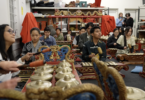Strict rules enforced by the International Olympic Committee are preventing unaccredited broadcasters from playing games related content, impacting the quality of material for many of Melbourne’s media outlets.
With the London Olympics in full swing, the IOC’s watchdogs have ensured that access inside venues where matches are conducted are made exclusive to outlets who have shelled out hundreds of thousands of dollars for association licences – mainly commercial and corporate organisations.
But for smaller media outlets, such as Melbourne’s many community organisations, such protocols mean broadcasting Olympic related content, including conversations and opinions on match results, and similar Olympic-sport related interviews, are required by law, to stick to the list of hefty regulations, or risk infringement.
Recent reports of a London butcher who was forced to take down a display of sausage rings in the style of the Olympic logo, as well as a London eatery called Olympic Cafe who was forced to temporarily change their name for the duration of games, indicate that the IOC are exercising protection around the Olympic brand, and won’t be taking any infringements lightly.
However, despite the negativity surrounding the protocols, many local media outlets won’t be denying Melbourne audiences of Olympic-related content.
Youth-run community radio station, SYN, thinks the protocols are restrictive in nature, but encourage programs to think of alternative methods of information delivery.
“There is definitely room…to get creative about working around these protocols and presenting the Olympics in an engaging manner, “ says radio programming manager Mabel Kwong.
In addition to supplying on-air teams with a guide on Olympic broadcasting regulations, Ms Kwong says SYN has paid special attention to specialist sport programs, and has reiterated protocols to ensure all regulations are met with.
“One has to remember that they [presenters] are allowed to talk about the Olympics in the course of conversation on-air, as long as this is done without insinuating an official connection between their programs.
“After all, community broadcasting is known to encourage creativity and innovation among its presenters,” she says.
Key radio news access rules for non-rights holders, outlined by IOC:
- Cannot re-broadcast any material during programs.
- Programs cannot be branded with Olympic language.
- No person/s can be interviewed from inside an Olympic venue, nor can they represent themselves as an official Olympic Correspondent.
- Cannot broadcast live commentary of any Olympic event.
- Cannot suggest or imply an official connection between themselves, or their organisation with the Olympics.
For a full outline of regulations, please refer to IOC website.






